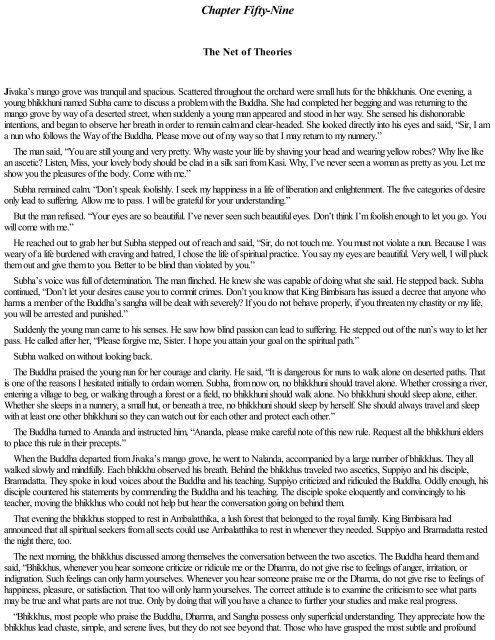old-path-white-clouds-thich-nhat-hanh
old-path-white-clouds-thich-nhat-hanh
old-path-white-clouds-thich-nhat-hanh
Create successful ePaper yourself
Turn your PDF publications into a flip-book with our unique Google optimized e-Paper software.
Chapter Fifty-Nine<br />
The Net of Theories<br />
Jivaka’s mango grove was tranquil and spacious. Scattered throughout the orchard were small huts for the bhikkhunis. One evening, a<br />
young bhikkhuni named Subha came to discuss a problem with the Buddha. She had completed her begging and was returning to the<br />
mango grove by way of a deserted street, when suddenly a young man appeared and stood in her way. She sensed his dishonorable<br />
intentions, and began to observe her breath in order to remain calm and clear-headed. She looked directly into his eyes and said, “Sir, I am<br />
a nun who follows the Way of the Buddha. Please move out of my way so that I may return to my nunnery.”<br />
The man said, “You are still young and very pretty. Why waste your life by shaving your head and wearing yellow robes? Why live like<br />
an ascetic? Listen, Miss, your lovely body should be clad in a silk sari from Kasi. Why, I’ve never seen a woman as pretty as you. Let me<br />
show you the pleasures of the body. Come with me.”<br />
Subha remained calm. “Don’t speak foolishly. I seek my happiness in a life of liberation and enlightenment. The five categories of desire<br />
only lead to suffering. Allow me to pass. I will be grateful for your understanding.”<br />
But the man refused. “Your eyes are so beautiful. I’ve never seen such beautiful eyes. Don’t think I’m foolish enough to let you go. You<br />
will come with me.”<br />
He reached out to grab her but Subha stepped out of reach and said, “Sir, do not touch me. You must not violate a nun. Because I was<br />
weary of a life burdened with craving and hatred, I chose the life of spiritual practice. You say my eyes are beautiful. Very well, I will pluck<br />
them out and give them to you. Better to be blind than violated by you.”<br />
Subha’s voice was full of determination. The man flinched. He knew she was capable of doing what she said. He stepped back. Subha<br />
continued, “Don’t let your desires cause you to commit crimes. Don’t you know that King Bimbisara has issued a decree that anyone who<br />
harms a member of the Buddha’s sangha will be dealt with severely? If you do not behave properly, if you threaten my chastity or my life,<br />
you will be arrested and punished.”<br />
Suddenly the young man came to his senses. He saw how blind passion can lead to suffering. He stepped out of the nun’s way to let her<br />
pass. He called after her, “Please forgive me, Sister. I hope you attain your goal on the spiritual <strong>path</strong>.”<br />
Subha walked on without looking back.<br />
The Buddha praised the young nun for her courage and clarity. He said, “It is dangerous for nuns to walk alone on deserted <strong>path</strong>s. That<br />
is one of the reasons I hesitated initially to ordain women. Subha, from now on, no bhikkhuni should travel alone. Whether crossing a river,<br />
entering a village to beg, or walking through a forest or a field, no bhikkhuni should walk alone. No bhikkhuni should sleep alone, either.<br />
Whether she sleeps in a nunnery, a small hut, or beneath a tree, no bhikkhuni should sleep by herself. She should always travel and sleep<br />
with at least one other bhikkhuni so they can watch out for each other and protect each other.”<br />
The Buddha turned to Ananda and instructed him, “Ananda, please make careful note of this new rule. Request all the bhikkhuni elders<br />
to place this rule in their precepts.”<br />
When the Buddha departed from Jivaka’s mango grove, he went to Nalanda, accompanied by a large number of bhikkhus. They all<br />
walked slowly and mindfully. Each bhikkhu observed his breath. Behind the bhikkhus traveled two ascetics, Suppiyo and his disciple,<br />
Bramadatta. They spoke in loud voices about the Buddha and his teaching. Suppiyo criticized and ridiculed the Buddha. Oddly enough, his<br />
disciple countered his statements by commending the Buddha and his teaching. The disciple spoke eloquently and convincingly to his<br />
teacher, moving the bhikkhus who could not help but hear the conversation going on behind them.<br />
That evening the bhikkhus stopped to rest in Ambalatthika, a lush forest that belonged to the royal family. King Bimbisara had<br />
announced that all spiritual seekers from all sects could use Ambalatthika to rest in whenever they needed. Suppiyo and Bramadatta rested<br />
the night there, too.<br />
The next morning, the bhikkhus discussed among themselves the conversation between the two ascetics. The Buddha heard them and<br />
said, “Bhikkhus, whenever you hear someone criticize or ridicule me or the Dharma, do not give rise to feelings of anger, irritation, or<br />
indignation. Such feelings can only harm yourselves. Whenever you hear someone praise me or the Dharma, do not give rise to feelings of<br />
happiness, pleasure, or satisfaction. That too will only harm yourselves. The correct attitude is to examine the criticism to see what parts<br />
may be true and what parts are not true. Only by doing that will you have a chance to further your studies and make real progress.<br />
“Bhikkhus, most people who praise the Buddha, Dharma, and Sangha possess only superficial understanding. They appreciate how the<br />
bhikkhus lead chaste, simple, and serene lives, but they do not see beyond that. Those who have grasped the most subtle and profound


